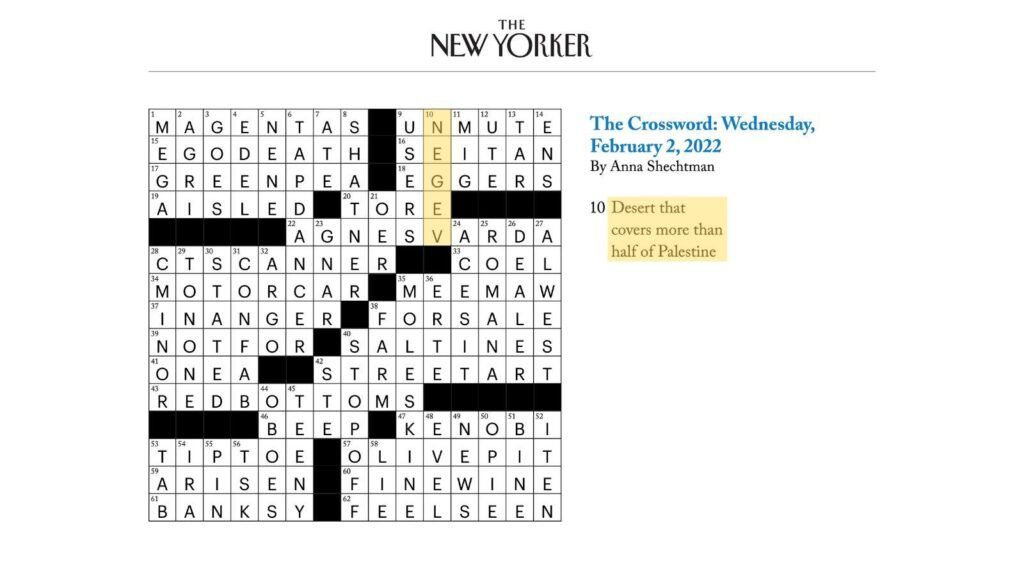Condé Nast, the global media conglomerate that owns Vogue and The New Yorker, published a piece this month, titled The Unsung Food Destinations to Travel for Now, which completely severs the connection between the city of Nazareth and the country where it’s located: Israel.
Meanwhile, the Condé Nast Traveler feature deems the inhabitants of this biblical town, associated in the New Testament as the home of the boyhood Jesus, as “Palestinian.”
Related Reading: Jesus Was a Jew, Not a Palestinian
The story, which purports to explore some of the great local food and flavors from around the world, portrays Nazareth this way:
…where Palestinian cooks, bakers, and producers proudly continue centuries-old traditions. At Elbabour, neighbors thumb earthy za’atar and tangy sumac, while at Almashedawi Bakery, regional staples like labneh and bitter greens are tucked into flatbread fresh from the taboon. And…skilled home cooks help the chefs at Luna Arabic Bistro turn out maqluba, an elaborate Palestinian dish of meat and rice—perfectly capturing a city where community and tradition are always on the table.”
Join the fight for Israel’s fair coverage in the news
Yet this is how the Elbabour restaurant on its website describes its culinary offerings:
…a family business, lovingly handed down from generation to generation. Jarjoura and Tony Kanaza are the brothers who currently operate the Mill. They’re driven by the desire to promote a culture of authentic spices, based on the healthy, natural, and diverse Nazarethian-Galilean-Christian cuisine.”
Similarly, Luna Arabic Bistro owner Luna Zreik has frequently cited her “Christian Arab household” as the inspiration for her much-talked-about eatery.
Regarding Almashedawi Bakery, a visit to the Nazareth municipality website reveals a host of recommended establishments for those with a sweet tooth. Nowhere on this page is the word ‘Palestinian’ used.
Where in the World is Nazareth? Hint: It’s Not in the West Bank
The anecdotal evidence above is indicative of a new reality. Data shows that most Arabs in Israel today self-identify primarily as “Israeli Arab” or “Israeli.” In fact, the Pluralism Index last year recorded a sharp decline in the number of people in Israel who consider their primary identity to be “Palestinian.”
The survey asked respondents to rate how much they agree with the phrase “I feel like a real Israeli.” Most Arabs responded that they either agree completely (65%) or somewhat agree (33%) with the statement.
Related Reading: Newsflash, Media: Israel’s Arab Minority Does Not ‘Largely Identify as Palestinian’
Condé Nast has thus lumped Israel’s largest minority in with their Arab Palestinian brethren in the West Bank and the Hamas-controlled Gaza Strip. But a quick check of any map shows that the city is located in Galilee, north of the West Bank and well inside the so-called ‘Green Line’.
Condé Nast’s Track Record on Israel
One may want to dismiss the inclusion of Nazareth and the exclusion of Israel — even though every other city cited in Condé Nast Traveler’s list also correctly lists its location country — as a simple case of sloppy journalism. The problem with that assumption is that Condé Nast subsidiaries have in recent months made a concerted effort to undermine Israel’s legitimacy.
Last year, Vogue Arabia posted an image of a flower-festooned Israel on its Instagram page and website, alongside a caption that described the Israeli-Palestinian conflict as a “hot-button” issue. It claimed the illustration was created by a Turkey-based artist in response to “Palestine not being included in Google Maps.”
However, Google had already debunked the claim that “Palestine” was deliberately wiped off maps of the region, explaining that there was no general consensus on what a potential Palestinian state’s borders would be.
Related Reading: How Maps Are Used to Undermine the Existence of Israel
More recently, The New Yorker Magazine’s online crossword puzzle on February 2 included a clue that referred to the Negev as a “desert that covers more than half of Palestine.”
Bizarrely though, The New Yorker chose to exclude “Israel” from the hint while including “Negev,” a Hebrew word describing the desert region framed by the Jewish state’s borders with Jordan and Egypt.

By inserting ‘Palestine’ in its crossword puzzle — and thus depicting it as a viable, functioning entity — The New Yorker Magazine demonstrated its total lack of regard for established facts. Moreover, the publication, whose weekly circulation exceeds 1.2 million, is effectively legitimizing unilateral Palestinian efforts to achieve statehood while bypassing peace talks with Israel.
Italian chef Giada De Laurentiis once said that “food brings people together on many different levels. It’s nourishment of the soul and body; it’s truly love.”
On the other hand, Condé Nast’s blatant politicization of the Israeli city of Nazareth and its reputation as a culinary destination is almost certain to leave readers with a bitter taste in the mouth.
We call on our readers to reach out to Condé Nast Traveler, either by sending a letter to the editor here or via Twitter, to ask that the Nazareth segment be amended. You may also want to message one of the writers of the segment, Devra Ferst.
Liked this article? Follow HonestReporting on Twitter, Facebook, Instagram and TikTok to see even more posts and videos debunking news bias and smears, as well as other content explaining what’s really going on in Israel and the region.
Featured Image: Israel Photo Gallery by Flickr



